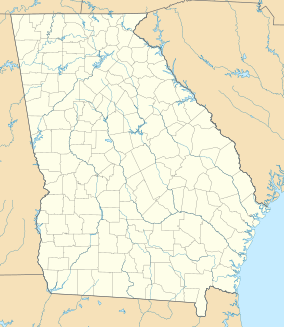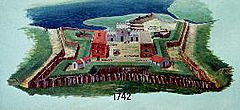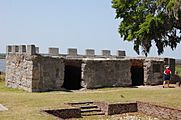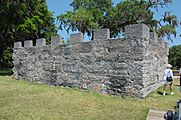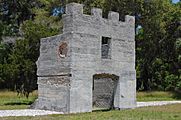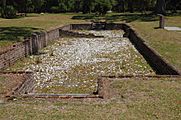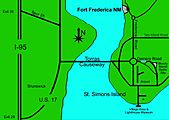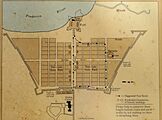Fort Frederica National Monument facts for kids
Quick facts for kids Fort Frederica National Monument |
|
|---|---|
| Location | St. Simons Island, Georgia, USA |
| Nearest city | Brunswick, Georgia |
| Area | 284.49 acres (115.13 ha) |
| Authorized | May 26, 1936 |
| Visitors | 293,041 (in 2011) |
| Governing body | National Park Service |
| Website | Fort Frederica National Monument |
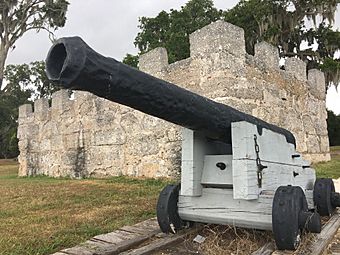
Fort Frederica in 2020
|
|
| Nearest city | Brunswick, Georgia |
| Area | 218 acres (88.2 ha) |
| Built | 1736 |
| NRHP reference No. | 66000065 (original) 100005351 (increase) |
| Significant dates | |
| Added to NRHP | October 15, 1966 |
| Boundary increase | July 23, 2020 |
Fort Frederica National Monument is a special place on St. Simons Island, Georgia. It protects the old remains of a fort and a town. James Oglethorpe built this fort and town between 1736 and 1748. Its main job was to protect the southern border of the British colony of Georgia. This was important because of possible attacks from Spanish forces.
About 630 British soldiers lived at the fort. A town with up to 1,000 people grew up outside the fort. This town was named Frederica, after Frederick, Prince of Wales. He was the son of King George II. Today, the monument is listed on the National Register of Historic Places. It was added on October 15, 1966.
Contents
A Look Back at Fort Frederica's History
The "Debatable Land" and Early Conflicts
In the early 1700s, the land between British South Carolina and Spanish Florida was called the "Debatable Land." This area was often fought over by Spain and Britain for many years. James Oglethorpe started the colony of Georgia in 1733. He wanted it to be a place for people who owed money to start fresh.
Colonists from England, Scotland, and Germany came to live there. They built Fort Frederica in 1736. This fort was meant to defend their new home from Spanish attacks. They named the town Frederica after Frederick, Prince of Wales. The name was made a bit different to avoid confusion with another fort in South Carolina.
Key Battles and the Fort's Decline
In 1742, important battles happened at Bloody Marsh and Gully Hole Creek. Forces led by Oglethorpe successfully stopped the Spanish from invading St. Simons Island. After these victories, the Spanish no longer threatened the colony.
Because the danger was gone, the government closed the fort in 1749. The town of Frederica then started to struggle. By 1755, most people had left. A fire in 1758 damaged the town, and soon after, it was completely abandoned.
Preserving History: A National Monument
Fort Frederica was officially recognized as a National Monument on May 26, 1936. This happened during the Great Depression under President Franklin D. Roosevelt. During this time, the Works Progress Administration (WPA) helped find and protect many historic places. This also gave people jobs.
Starting in 1947, the National Park Service and a group called the Ft. Frederica Association began studying the site. They used old maps and journals from the 1700s to guide their work. Archaeological digs helped them uncover parts of the fort and village. By comparing what they found with historical records, they learned a lot about Frederica's past. This helped us understand a complex time of international rivalries.
Fort Frederica is a historic area managed by the National Park Service. It was added to the National Register of Historic Places on October 15, 1966. Today, Fort Frederica is open to everyone, and there is no charge to visit.
Gallery
Images for kids
Related Places to Explore
- Fort Argyle
- Battle of Bloody Marsh
- Battle of Gully Hole Creek
- Castillo de San Marcos National Monument
- Fort Caroline National Memorial
- Fort King George
- Fort Matanzas National Monument
- Fort Morris State Historic Site
- Wormsloe Historic Site
- Oglethorpe Plan
- List of national monuments of the United States
 | Delilah Pierce |
 | Gordon Parks |
 | Augusta Savage |
 | Charles Ethan Porter |


